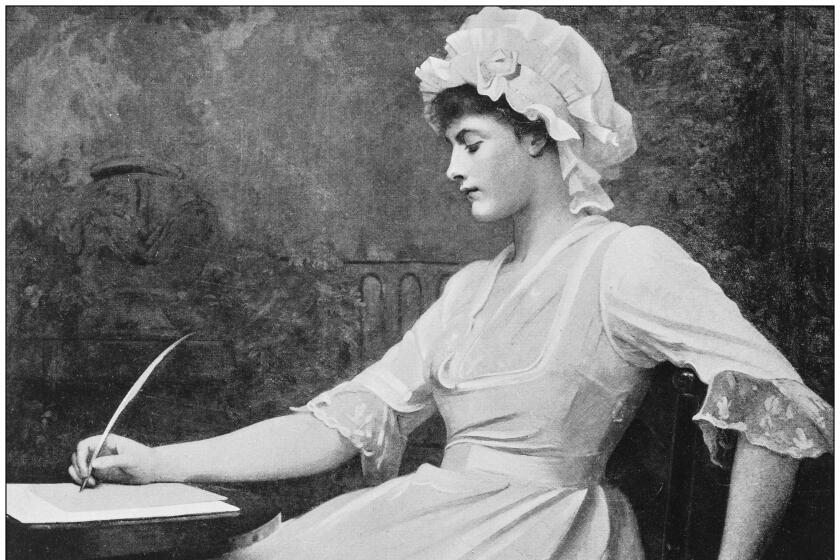An overthinker has a miscarriage in a novel both lurid and painfully cerebral
- Share via
On the Shelf
The Life of the Mind
By Christine Smallwood
Hogarth: 240 pages, $27
If you buy books linked on our site, The Times may earn a commission from Bookshop.org, whose fees support independent bookstores.
“The Life of the Mind” follows the perspective of a woman experiencing a medicated abortion, the result of a miscarried pregnancy. This framework will likely determine whether or not you’re willing to come up against its narrator’s consciousness. It isn’t that you must have had an abortion or a miscarriage or a pregnancy or even a vagina to be interested in reading Christine Smallwood’s first novel; it’s whether you have the stamina to spend 230 pages inside a deeply analytical brain struggling to make sense of a body that is itself struggling to process what is happening to it.
Even before the miscarriage, Dorothy’s been having a difficult time, though she is far too circumspect, and her malaise too vague, to describe it that way. She is an adjunct English professor in New York City dog-paddling to status-signal her worth in academia; she has two therapists, the first of whom is unaware of the second; aside from her boyfriend Rog, the would-have-been father, she has told nobody — not her best friend, not her therapists — about her pregnancy or its end.
Time in this slim yet yawning book is slippery, catalogued by bloody expulsions in public bathrooms over about a month. As telegraphed by the title, plot is subordinated to the real action within the synapses of Dorothy’s brain, which toggles among conclusions apocalyptic and mundane, literary parallels and the function her body is currently performing. These are not insignificant considerations, nor are they insincere — Dorothy is an interesting thinker and Smallwood can write a sentence. Yet at times they border on tenuous or tedious, as when she compares a homeless man on the train to Coleridge’s ancient mariner, and then the albatross around her neck, before doubling back to say that the thought was simply poetry unloosed from a book; or when she finds the experience of her ultrasound lacking in comparison to her favorite scene (transcribed in full) in Thomas Mann’s “The Magic Mountain.” Occasionally, Dorothy’s allusions, spanning Kafka and Du Maurier and Claire Berlant, resemble the clumsy spackling of a doctoral dissertation.
Megan Nolan’s “Acts of Desperation,” about a woman in thrall to an older man, stands out from similar tales with an uncannily self-aware narrator.
More interesting than her self-aware displays of knowledge are Dorothy’s blunt-edge observations. “Her womb would not let go,” she thinks, after having to double her dose of the contraction-inducing medication Cytotec. “She was too shallow to have an interior this deep,” she considers as an ultrasound wand exposes her insides. “One day this would be Venice,” she muses while drinking piña coladas with her mentor at the Venetian in Las Vegas. These pared-back moments allow for breath, space, the slightest inflection of humor — and, most important, a rare glimpse of the narrator free from the anxiety of literary influence.
What’s less interesting is the novel’s insistence on gawking at the flesh, which at times reads as if it were coming from outside of Dorothy, through the lens of a drone hovering above. There’s plenty of description of the aborted matter itself — “curdled,” “gelatinous,” “resiny” — plus details about stained panty liners and tampon saturation, with the obvious intention of destroying taboos around the female reproductive system and the mundane horrors it presents day after month after year.
There is a detached curiosity to those descriptions. But others seem thirstier for attention — including the first line: “Dorothy was taking a s— at the library when her therapist called and she let it go to voicemail.” Elsewhere, she remembers the “streams of white confetti” bursting from a cyst in her roommate’s elbow; realizes a long hair is attached not to her head but to her neck; defiantly wipes “back to front”; describes a hookup with a woman in which the contents of a period cup are spattered across a college bathroom. Such moments have the potential to shed new light on the reality of bodies, but in Smallwood’s novel they seem to crop up as graphic ballast against Dorothy’s cerebral flights. Without enough context, they feel more like provocation than revelation.
Novelist Lynn Steger Strong on the revolutionary passivity of Rachel Cusk, Ottessa Moshfegh and Sally Rooney — how we’ve misread them and what comes next.
In the publisher’s note, Smallwood is compared to Sheila Heti, Rachel Cusk and Jenny Offill, and these comparisons aren’t incorrect. Woven throughout “The Life of the Mind” is Heti’s keen observation of her social circle, glimmers of Cusk’s medium-like once-removed storytelling, and a tendency toward the fragmentary, of which Offill has become the literary establishment’s patron saint. Inevitably, Smallwood will be placed in the same bucket as other female authors negotiating the links between the brain and body (or the lack thereof), and perhaps one day, years in the future, another debut novel will be held up against her own explorations of the roiling textures of the mind. For her part, Smallwood is talented, and her work is unafraid of wading into the thicker, more literally visceral parts of female experience. I look forward to her next experiment in dissecting the sticky oddity of liminal existence.
The final scene of Smallwood’s novel is perhaps the book’s most successful. Throughout “The Life of the Mind,” Dorothy is searching for an ending. She teaches a class called “Writing Apocalypse.” She is sure she’s “living at the end of something, or too many somethings to say.” She insists on accompanying her best friend while she embarks on her own at-home abortion, possibly craving witness to someone else’s experience of an ending. And by the final lines, though time still stretches before her, Dorothy’s desire for finality is externalized in such a subtle, quiet way as to seem nearly satisfying.
Pariseau is a writer and editor in New Orleans.
The poet, viral tweeter and author has a new novel, “Milk Fed,” imagining an explicit affair between a damaged Hollywood loner and a plus-size woman.
More to Read
Sign up for our Book Club newsletter
Get the latest news, events and more from the Los Angeles Times Book Club, and help us get L.A. reading and talking.
You may occasionally receive promotional content from the Los Angeles Times.












